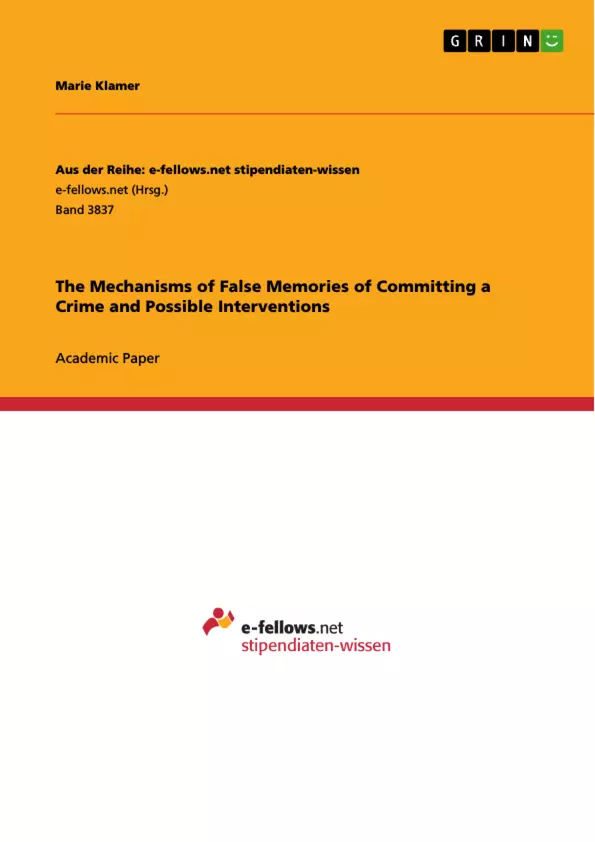Recent empirical research has provided evidence that false memories of committing a crime can be generated through suggestive techniques. This finding is particularly relevant in light of DNA exonerations that have proven the innocence of convicted individuals. Drawing on empirical research and psychological frameworks, this paper aims at exploring how false memories of committing a crime can be created. Specifically, the source monitoring model and classic psychological theories are taken into account to discuss underlying mechanisms of false memories. Additionally, risk factors and implications are discussed. This paper concludes with the consideration of possible interventions that could reform current interrogation practices.
Inhaltsverzeichnis (Table of Contents)
- Introduction
- Distinguishing between false memories and false confessions
- Advances in the research of false memories
- Mechanisms and risk factors of false memories
Zielsetzung und Themenschwerpunkte (Objectives and Key Themes)
This paper aims to explore how false memories of committing a crime can be created, discuss the implications of such false memories, and offer possible interventions to reform current interrogation practices. It utilizes empirical research and psychological frameworks, particularly the source monitoring model and classic psychological theories, to delve into the underlying mechanisms of false memories.
- Mechanisms of false memory creation
- Implications of false memories for individuals and legal stakeholders
- Risk factors associated with false memory generation
- Possible interventions to address false memory issues in interrogation practices
- The impact of false memories on legal confessions and the accuracy of eyewitness testimony
Zusammenfassung der Kapitel (Chapter Summaries)
- The Introduction provides an overview of the topic of false memories of committing a crime, highlighting the significance of this issue in light of DNA exonerations and the prevalence of false confessions. It outlines the paper's objectives and structure.
- The chapter "Distinguishing between false memories and false confessions" clarifies the differences between these two concepts, emphasizing that while a false memory does not necessarily lead to a confession, it can contribute to a false confession.
- The chapter "Advances in the research of false memories" reviews existing research on false memories, highlighting studies that have successfully generated false memories of committing a crime. It also discusses the similarities between false and true memories and addresses criticism surrounding some studies.
- The chapter "Mechanisms and risk factors of false memories" explores the underlying mechanisms of false memory creation, drawing on cognitive and social psychological theories such as the source monitoring framework and behaviorism. It identifies several risk factors, including suggestive language, inaccurate information, and pressure, that contribute to false memory generation.
Schlüsselwörter (Keywords)
The primary keywords and focus topics of this paper include false memory, legal confessions, interrogation practices, source monitoring, misinformation effect, eyewitness suggestibility, and risk factors for false memory generation. These terms encompass the core concepts and themes explored within the paper.
- Arbeit zitieren
- Marie Klamer (Autor:in), 2020, The Mechanisms of False Memories of Committing a Crime and Possible Interventions, München, GRIN Verlag, https://www.hausarbeiten.de/document/1033881


